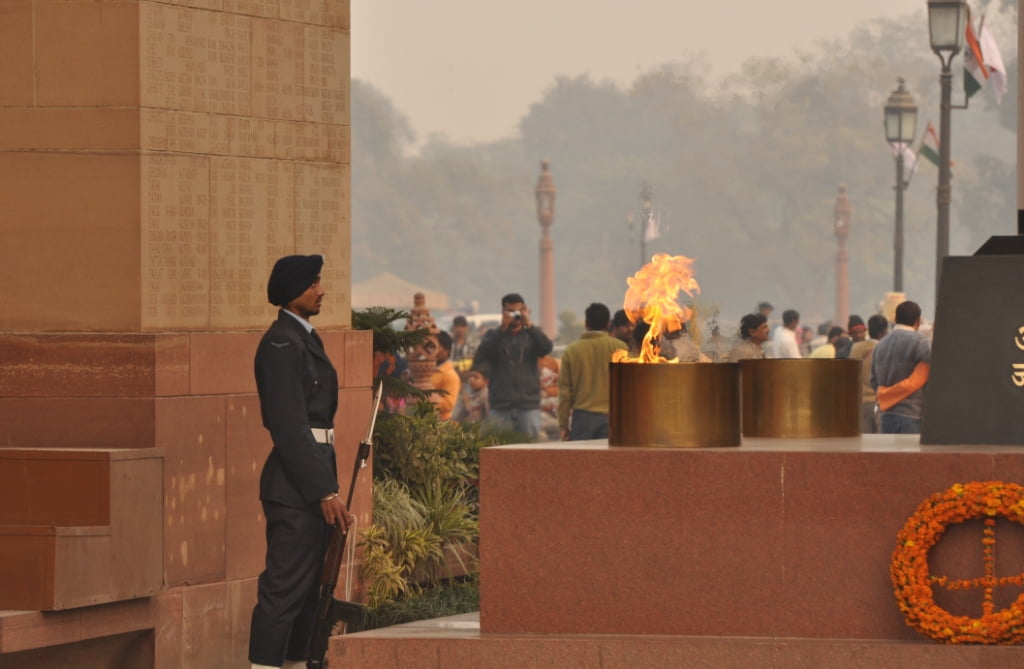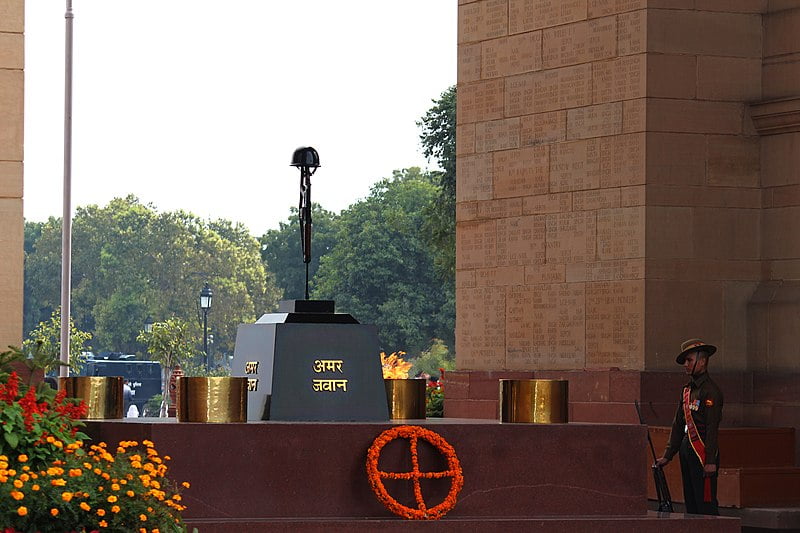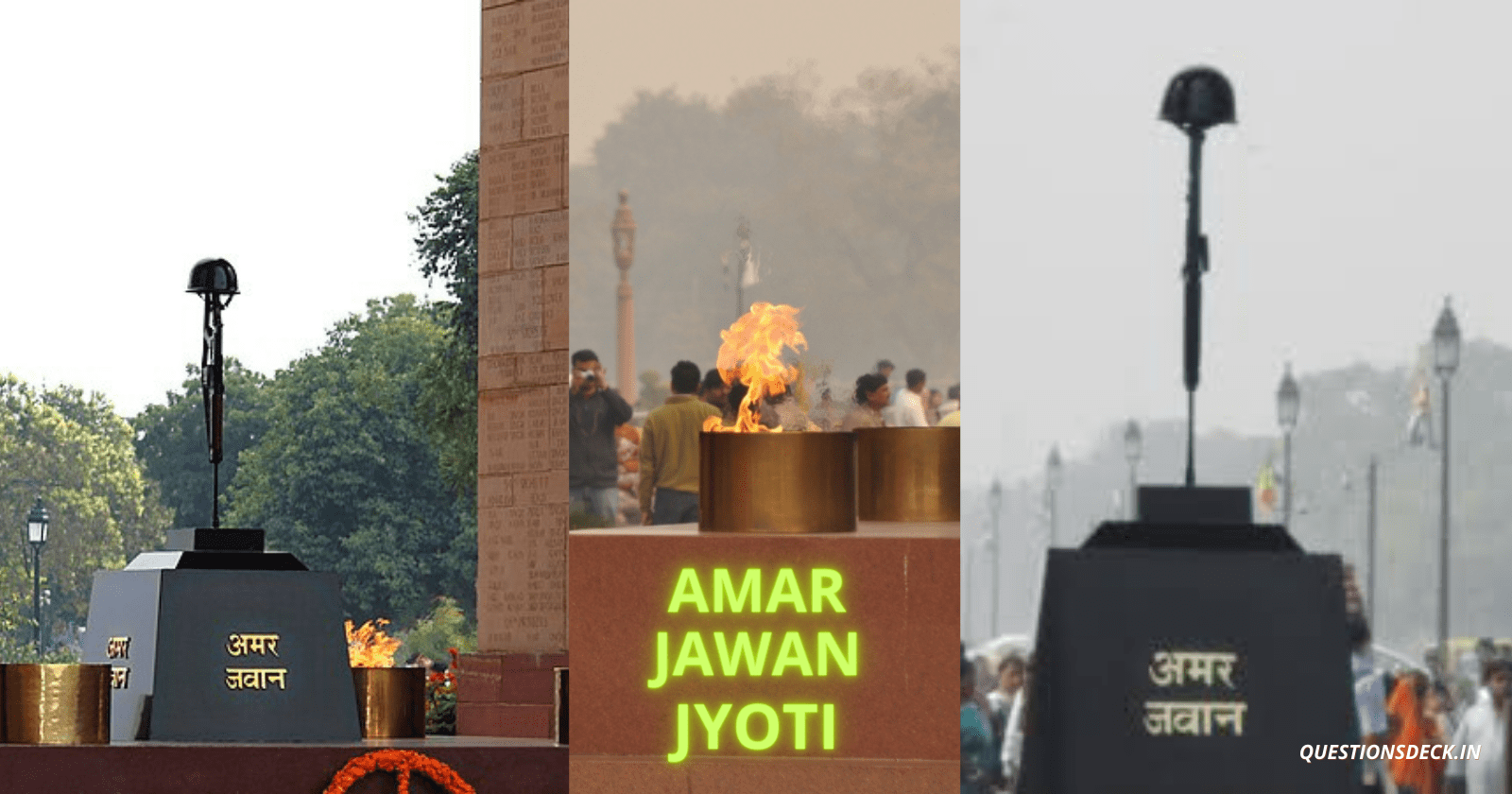Introduction: The significance of the Amar Jawan Jyoti Memorial
The Amar Jawan Jyoti Memorial, also known as the “Eternal Flame,” is a significant national monument in India that honors the soldiers who have died while serving in the Indian armed forces. The memorial is located at India Gate in New Delhi and consists of a flame that burns day and night under the archway.
The memorial is significant as it serves as a symbol of the sacrifices made by the Indian armed forces and serves as a reminder of the country’s patriotism. It is a place of pilgrimage and remembrance for the families of fallen soldiers as well as for the general public.
The memorial is also significant in terms of India’s military history as it serves as a reminder of the country’s struggle for independence and the sacrifices made during that time. It is a symbol of the nation’s sorrow and pride and serves as a reminder of the sacrifices made to protect the country and its people.
Additionally, the memorial is an important tourist attraction and is visited by many people from India and abroad. It is a place of national importance and is considered a sacred site by many. The flame burns continuously as a symbol of the eternal sacrifice made by the soldiers and as a symbol of the nation’s gratitude towards them.
History and Origins of the Memorial: How and why it was created
The history and origins of the Amar Jawan Jyoti Memorial can be traced back to 1971, when India was at war with Pakistan. During the war, a large number of Indian soldiers lost their lives while defending the country. To honor their sacrifices, the government of India decided to create a memorial at India Gate in New Delhi, which would be dedicated to the soldiers who had died in the line of duty.
The memorial was officially unveiled on January 26, 1972, which is India’s Republic Day. It was built under the archway of India Gate, which is a war memorial that was built to honor the Indian soldiers who died in World War I. The memorial is a simple structure consisting of a small platform and an eternal flame that burns day and night.
The eternal flame was lit for the first time on January 26, 1972, by the then Prime minister Indira Gandhi, in the memory of soldiers who died in the Indo-Pak War of 1971. Since then, the flame has been burning continuously as a symbol of the eternal sacrifice made by the soldiers and as a symbol of the nation’s gratitude towards them.
The memorial was created as a way to honor the sacrifices made by the Indian armed forces and to serve as a reminder of the country’s patriotism. It serves as a place of pilgrimage and remembrance for the families of fallen soldiers as well as for the general public, and it is also an important tourist attraction that is visited by many people from India and abroad.
The Symbolism of the Eternal Flame: What it represents and stands for

The eternal flame at the Amar Jawan Jyoti Memorial symbolizes the sacrifices made by the Indian armed forces and serves as a reminder of the country’s patriotism. It represents the eternal nature of the sacrifices made by the soldiers who died while serving the country, and it serves as a constant reminder of their service and sacrifice.
The flame also symbolizes the fact that the memory of the fallen soldiers will never be forgotten and that their sacrifices will always be remembered. It also represents the continuity of the nation’s gratefulness for their sacrifices.
The flame also serves as a symbol of hope and a reminder of the sacrifices made in the past to protect the country and its people. It is a symbol of the nation’s sorrow and pride, and it serves as a reminder of the sacrifices made to protect the country and its people.
Furthermore, the eternal flame also symbolizes the idea of sacrifice, a constant reminder of the ultimate sacrifice made by soldiers for their country and its people. The flame is also a symbol of unity and continuity, as it burns continuously, day and night, connecting the past, present and future.
In summary, the eternal flame at the Amar Jawan Jyoti Memorial is a powerful symbol that represents the sacrifices made by the Indian armed forces and serves as a reminder of the country’s patriotism. It is a symbol of the nation’s sorrow and pride, and it serves as a reminder of the sacrifices made to protect the country and its people.
Ceremonies and Events: How the memorial is honored and remembered
The Amar Jawan Jyoti Memorial is honored and remembered through a variety of ceremonies and events that take place at the site. Some of the most significant ceremonies and events include:
- Republic Day: On January 26th of every year, the President of India and other dignitaries lay wreaths at the memorial as a mark of respect to the soldiers who have died in the line of duty.
- Independence Day: On August 15th of every year, the Prime Minister of India lays a wreath at the memorial as a mark of respect to the soldiers who have died in the line of duty.
- Martyrs’ Day: On January 30th of every year, a wreath-laying ceremony is held at the memorial to honor Mahatma Gandhi, who was assassinated on that day in 1948.
- Ceremonies on Kargil Vijay Diwas: On July 26th of every year, a wreath-laying ceremony is held at the memorial to honor the soldiers who lost their lives during the Kargil War in 1999.
- Other ceremonies and events: Many other ceremonies and events are organized by various organizations and individuals throughout the year to honor the memory of the soldiers who have died in the line of duty.
These ceremonies and events serve as a way to remember and honor the sacrifices made by the Indian armed forces. They are attended by family members of fallen soldiers, government officials, military leaders, and members of the public. These ceremonies are an important part of the nation’s tradition and culture, and they help to ensure that the memory of the fallen soldiers will never be forgotten.
How did Amar Jawan Jyoti burn?
The eternal flame at the Amar Jawan Jyoti Memorial is kept burning by a steady supply of fuel, such as natural gas. The flame is lit using a pilot light, and the gas is then continuously supplied to the flame to keep it burning. The flame is also tended to by personnel who monitor and adjust the flame’s intensity and make sure that it burns continuously.
It’s important to note that the information about how the flame burns is based on general information about how eternal flames are maintained, specific information about how the flame at the Amar Jawan Jyoti Memorial is maintained is not publicly available. The maintenance of the flame is considered to be a closely guarded secret.
The Significance of the Memorial in India’s Military History

The Amar Jawan Jyoti Memorial holds a significant place in India’s military history for several reasons:
- It serves as a reminder of the sacrifices made by the Indian armed forces: The memorial is a constant reminder of the sacrifices made by the soldiers who died while serving the country. It serves as a reminder of the sacrifices made by the Indian armed forces in the past and the sacrifices that continue to be made today.
- It is a symbol of India’s struggle for independence: The memorial was built in the aftermath of the 1971 war between India and Pakistan, which was a major milestone in India’s struggle for independence. It serves as a reminder of the sacrifices made during that time and the role that the Indian armed forces played in securing the country’s independence.
- It is a symbol of national unity: The memorial is a symbol of national unity, as it brings together people from all walks of life to honor the memory of the fallen soldiers. It serves as a reminder that the sacrifices made by the Indian armed forces are for the benefit of all Indians, regardless of their background or beliefs.
- It is a symbol of the nation’s gratitude: The memorial serves as a symbol of the nation’s gratitude towards the soldiers who have died in the line of duty. It serves as a reminder that the sacrifices made by the Indian armed forces will never be forgotten and that the nation will always be grateful for their service.
In summary, the Amar Jawan Jyoti Memorial holds a significant place in India’s military history as it serves as a reminder of the sacrifices made by the Indian armed forces, a symbol of India’s struggle for independence, a symbol of national unity, and a symbol of the nation’s gratitude.
Visitors’ experiences and personal accounts
Visitors to the Amar Jawan Jyoti Memorial often have a moving and emotional experience. Many people visit the memorial to pay their respects to the soldiers who have died in the line of duty and to honor their memory. For some visitors, it is a place of pilgrimage, while for others it is a place to reflect on the sacrifices made by the Indian armed forces.
Visitors to the memorial often comment on the powerful symbolism of the eternal flame and the solemn atmosphere at the site. They often express their gratitude towards the soldiers who have died in the line of duty and their admiration for the sacrifices they have made.
Many visitors also leave flowers or other tributes at the memorial as a mark of respect. Some visitors also take pictures to remember their visit, as a way to show their respect.
The families of fallen soldiers also visit the memorial to pay their respects and to honor the memory of their loved ones. For them, the memorial is a place of solace and a reminder of the sacrifices made by their loved ones.
In summary, the Amar Jawan Jyoti Memorial is a powerful and emotional place for visitors, a symbol of the sacrifices made by the Indian armed forces, a place of pilgrimage and a place of reflection. It is a place where visitors can pay their respects and honor the memory of the fallen soldiers.
Conclusion: The enduring importance of the Amar Jawan Jyoti Memorial
In conclusion, the Amar Jawan Jyoti Memorial, also known as the “Eternal Flame,” holds a significant place in India’s history and culture as a national monument that honors the soldiers who have died while serving in the Indian armed forces. The eternal flame that burns day and night under the archway of India Gate serves as a powerful symbol of the sacrifices made by the Indian armed forces and serves as a reminder of the country’s patriotism.
The memorial’s history and origins can be traced back to 1971, when India was at war with Pakistan, and it was officially unveiled on January 26, 1972, which is India’s Republic Day. The memorial is honored and remembered through a variety of ceremonies and events, such as the Republic Day, Independence Day, Martyrs’ Day and other ceremonies throughout the year.
The memorial holds a significant place in India’s military history as it serves as a reminder of the sacrifices made by the Indian armed forces, a symbol of India’s struggle for independence, a symbol of national unity, and a symbol of the nation’s gratitude.
Visitors to the memorial often have a moving and emotional experience and leave with a sense of gratitude and admiration for the sacrifices made by the Indian armed forces.
In summary, the Amar Jawan Jyoti Memorial is a powerful and enduring symbol of the sacrifices made by the Indian armed forces and serves as a reminder of the country’s patriotism, history and culture. It will always remain an important and sacred place, where visitors come to pay their respects and honor the memory of the fallen soldiers.

